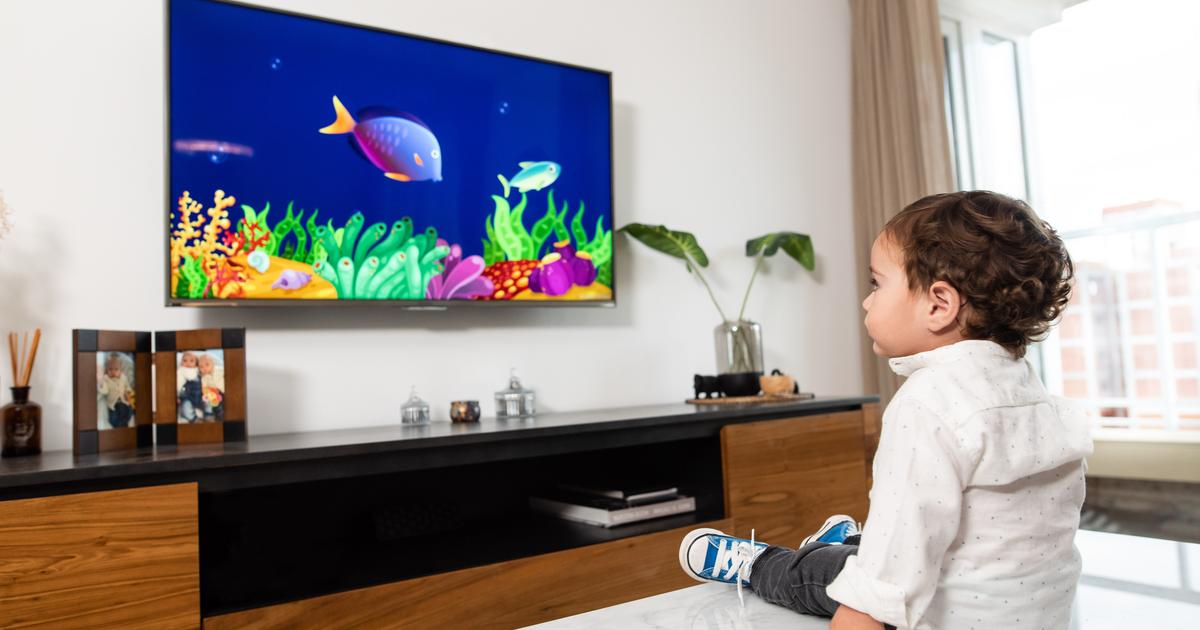Despite studies and warnings, the use of screens among toddlers has increased significantly
New research shows disturbing data on screen exposure in children, which means it starts at an earlier age. According to the data, screen time among toddlers has skyrocketed in the United States, and Canada's children also significantly exceed WHO recommendations
The children are exposed to the recommended screen time, and from a younger age. Sponge Bob in front of television (Photo: ShutterStock)
Sponge Bob Gifts Watching TV (Photo: Giphy)
In recent years, many studies have been done to try to answer the question most of us are afraid of: Will our accelerated use of technology come back to us like a boomerang in the future, and hurt our body or brain? Research has already shown that prolonged exposure to screens is affecting us, especially our children. It affects their cognitive development, body health and mood. And despite all this high-frequency data and findings, this week JAMA Pediatrics magazine published two new studies that show alarming data on the use of screens for toddlers.
More in Walla! NEWS More in Walla! NEWSToddlers who spend a lot in front of the screen will suffer from developmental delay as early as age 5
To the full articleThe first study showed that screen time among toddlers aged 12 months to three years jumped in the United States. As part of the study, nearly 4,000 mothers from upstate New York were asked about the screen usage habits of their toddlers at 12, 18, 24, 30 and 36 months. The answers they gave were later compared to the results of similar questions asked when the children were 7 and 8 years old. The findings showed that children's daily use of television, computers and mobile devices increased three-fold from 12 months to three years, and went from an average of 53 minutes at 12 months to more than 150 minutes. Of the investigators, the children who spent the most time in front of the screens were the elders of their mothers, twins, children cared for at home and not in settings such as day care or kindergarten, and children whose parents only partially attended school.
More in Walla! NEWS
How long are children allowed to watch the screen and when can they start? World Health Organization: Children under the age of one should not be exposed to screens "Mommy, leave the phone": Parents also have a problem with the screens Baruch we dismissed: the safest method to get rid of nail fungus Promoted ContentEdwina Jung, a senior researcher at the Eunice Kennedy Shriver Institute for Child Health in Rockville USA, released a press statement: "The results we got show that screen viewing habits start at an early age. The findings suggest that screen time reduction intervention will have a better chance of succeeding when introduced early. "
The study found that the toddler's screen time was related to his mother's prolonged use. Mother, baby and smartphone (Photo: shutterstock)
Mother and baby lying on floor and photographing selfie (Photo: ShutterStock)
The second study was conducted among children in Canada and found that more than 79 percent of toddlers at 2 years of age and almost 95 percent of children at age 3 significantly exceeded WHO guidelines not to expose children of these ages to over an hour a day of quality programs for their age. The study used data collected on maternal and child pairs from family studies done at the University of Calgary. It was found that overuse of screens has been consistently associated with excessive use of the mother's screen, especially for mothers who cared for their children at home. According to the researchers, this figure may make it more difficult for parents to limit their child's involvement in screens and build a family plan. "This includes promoting opportunities for shared media engagement; deciding when, where, and how long screens can be used; strengthening the need for sleep, exercise, and device-free interactions," the study claims.
So what is the recommended dose?
As mentioned, the World Health Organization recommends zero screen time for infants under the age of one, and encourages interactive play with them on the floor several times a day, including at least 30 minutes of abdominal activity. When babies are inactive, the organization encourages the attending adult to read and tell children's stories. For children from the age of 4 to 4, the recommendation is that they should not be in front of screens more than an hour a day and in general - "less is better". Screen time should be done with parental involvement or other adult care, but instead, it is more important that children of this age spend at least an hour a day for moderate to vigorous exercise. It is also important to let them sleep between 10-14 hours of quality sleep at night.
According to the American Academy of Pediatrics (AAP), a baby under 18 should not be exposed to the screen at all except for family-to-face interactions. Children between 18 months and 5 years of age should only be exposed to one hour a day, preferably with parents or caregivers who are relevant to the content on the screen.









